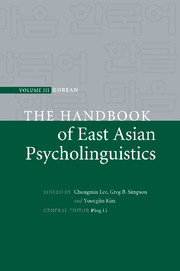Book contents
- Frontmatter
- Contents
- List of figures
- List of tables
- List of contributors
- Preface
- Introduction: Advances in Korean psycholinguistics
- Part I Language acquisition
- Part II Language processing
- 28 Visual processing of Hangul, the Korean script
- 29 English vowel spaces produced and perceived by Americans and Koreans
- 30 Morphological representation and processing of Sino-Korean words
- 31 The role of phonology in word recognition of Korean Hangul and Hanja
- 32 Lexical and sublexical processes in Korean word recognition
- 33 Prosody in sentence processing
- 34 Korean sentence processing
- 35 Sentence processing and memory representation in Korean
- 36 Understanding complex sentences: memory constraints and informational structure
- 37 ERP studies of Korean language processing: word-order effects
- 38 Inferences during discourse comprehension in Korean
- 39 Morpho-syntactic processing in Korean aphasics
- 40 Morpho-syntactic processing of Korean-speaking adults with Broca's aphasia
- 41 Comprehension deficits in Korean agrammatic aphasia
- 42 Developmental reading disorders in Korean
- 43 Individual differences in Korean language processing: context-dependent processing of skilled readers in word ambiguity resolution
- 44 A computational model of lexical and morphological processing in Korean
- References
- Name index
- Subject index
38 - Inferences during discourse comprehension in Korean
from Part II - Language processing
Published online by Cambridge University Press: 05 June 2012
- Frontmatter
- Contents
- List of figures
- List of tables
- List of contributors
- Preface
- Introduction: Advances in Korean psycholinguistics
- Part I Language acquisition
- Part II Language processing
- 28 Visual processing of Hangul, the Korean script
- 29 English vowel spaces produced and perceived by Americans and Koreans
- 30 Morphological representation and processing of Sino-Korean words
- 31 The role of phonology in word recognition of Korean Hangul and Hanja
- 32 Lexical and sublexical processes in Korean word recognition
- 33 Prosody in sentence processing
- 34 Korean sentence processing
- 35 Sentence processing and memory representation in Korean
- 36 Understanding complex sentences: memory constraints and informational structure
- 37 ERP studies of Korean language processing: word-order effects
- 38 Inferences during discourse comprehension in Korean
- 39 Morpho-syntactic processing in Korean aphasics
- 40 Morpho-syntactic processing of Korean-speaking adults with Broca's aphasia
- 41 Comprehension deficits in Korean agrammatic aphasia
- 42 Developmental reading disorders in Korean
- 43 Individual differences in Korean language processing: context-dependent processing of skilled readers in word ambiguity resolution
- 44 A computational model of lexical and morphological processing in Korean
- References
- Name index
- Subject index
Summary
Introduction
In the field of discourse comprehension, it is assumed that the goal of reading is to build a coherent representation. To do that, readers need to recognize the relations between the parts of the discourse and piece them together. Readers may have to fill in the information implied in the text and even elaborate on what is mentioned. All these processes that ‘go beyond’ the information given in the text are called inference (Graesser, Singer & Trabasso, 1994; Schank & Abelson, 1977). In recent decades, numerous studies in the field of discourse comprehension have been conducted around the problem of inference. What inferences occur, when they occur and how they affect the memory of the discourse have been the main issues in this field.
In this chapter, we review studies conducted in Korean on inferences during reading and their effects on memory. While many interesting findings have been reported from the studies conducted in Korean, a large proportion of them are consistent with the findings from studies in English. Inference in discourse comprehension seems to be a process which is less affected by the structure and characteristics of a specific language than are earlier processes such as speech perception, word recognition, or sentence parsing. More abstract and higher levels of cognition, universal to humans, appear to be involved in inference. Still, there are many novel findings that have not been observed in comparable studies in English.
- Type
- Chapter
- Information
- The Handbook of East Asian Psycholinguistics , pp. 474 - 483Publisher: Cambridge University PressPrint publication year: 2009



